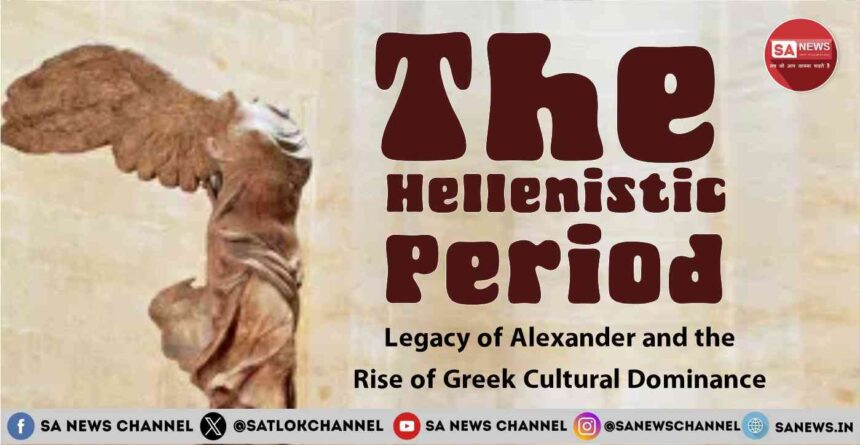The term Hellenistic comes from the Greek word “Hellēnistikos”, which means “pertaining to Greek culture”.
- The Death of Alexander and the Birth of a New Era
- Political Landscape of the Hellenistic Kingdoms
- Cultural Syncretism and the Spread of Hellenism
- Urbanization and the Rise of New Cities
- Developments in Science and Learning
- Philosophy: From Ethics to Cosmopolitanism
- Art and Aesthetics: Emotional Realism
- Economic Expansion and Trade Networks
- Religion and the Rise of Mystery Cults
- The Decline of Hellenistic Powers
- Hellenistic Influence on Rome and Beyond
- A Deeper Insight: True Wisdom Beyond Hellenistic Brilliance
- FAQs about the History of the Hellenistic Period
- 1. What marked the beginning and end of the Hellenistic Period?
- 2. What were the major kingdoms of the Hellenistic era?
- 3. How did the Hellenistic Period influence science and philosophy?
- 4. What role did Alexandria play during the Hellenistic Period?
- 5. How did Hellenistic culture spread across regions?
- Connect With Us on the Following Social Media Platforms
The Hellenistic Period, spanning from the death of Alexander the Great in 323 BCE to the Roman conquest of Egypt in 31 BCE, marks a defining era in the annals of world history. It witnessed the fusion of Greek culture with elements from Egypt, Persia, India, and the broader Near East, leading to unprecedented developments in politics, science, art, and philosophy.
This epoch is not merely a continuation of classical Greek traditions but an expansive evolution of them, reshaped by the ambitions of kings, the curiosity of scholars, and the vibrancy of newly integrated cultures.
The Death of Alexander and the Birth of a New Era
The sudden death of Alexander the Great in Babylon at the age of 32 created a power vacuum in one of the largest empires ever assembled. With no clear heir, his son Alexander IV was still an infant, the empire fractured among his generals, known as the Diadochi (Successors). These successors, each vying for supremacy, eventually carved the empire into several Hellenistic kingdoms:
- Ptolemaic Egypt under Ptolemy I Soter
- Seleucid Empire under Seleucus I Nicator
- Antigonid Macedonia under Antigonus I and his descendants
- Smaller regions ruled by other generals in Asia Minor and Thrace
The wars of succession, known as the Wars of the Diadochi, were brutal, but they laid the foundation for the Hellenistic world.
Political Landscape of the Hellenistic Kingdoms
Despite their Greek origins, the new rulers adapted to local customs to strengthen their legitimacy. In Egypt, for instance, Ptolemy declared himself Pharaoh, aligning with the traditional role of divine kingship. The Seleucids governed a vast and culturally diverse domain stretching from Asia Minor to parts of India, often struggling to maintain unity.
Each kingdom maintained royal courts, bureaucracies, and military systems modeled after Alexander’s administration but tailored to their geographic and cultural realities. Though often at war with one another, these monarchs patronized arts and sciences, transforming their capitals into hubs of intellectual life.
Cultural Syncretism and the Spread of Hellenism
The term “Hellenistic” derives from the Greek word “Hellēnizein,” meaning to speak Greek or adopt Greek ways. Yet, this era was not about cultural domination but mutual influence. Cities like Alexandria, Antioch, and Pergamon became cosmopolitan centers where Greek merged with Egyptian, Persian, and Mesopotamian traditions.
In architecture, this syncretism manifested in grand structures that blended Greek columnar styles with Eastern motifs. Egyptian temples were built with Greek inscriptions, and local deities were reinterpreted through a Hellenic lens, such as the identification of the Egyptian god Amun with Zeus.
Urbanization and the Rise of New Cities
One of Alexander’s most enduring legacies was city-building. Dozens of cities, often named Alexandria, were established across the empire. These cities followed Greek urban planning, complete with agoras, theaters, gymnasiums, and temples. They served as administrative centers and cultural beacons.
Alexandria in Egypt, in particular, flourished as a symbol of Hellenistic achievement. It became a melting pot of ideas, home to the famed Library of Alexandria and the Musaeum, an ancient research institution that rivaled modern universities in scope and influence.
Developments in Science and Learning
The Hellenistic age was a golden period for intellectual pursuit. Freed from the constraints of traditional city-state politics, thinkers operated under royal patronage, allowing for groundbreaking inquiry in various fields:
- Astronomy: Aristarchus of Samos proposed a heliocentric model of the solar system centuries before Copernicus.
- Mathematics: Euclid’s Elements became the foundation of geometry.
- Medicine: Herophilos conducted anatomical studies in Alexandria, distinguishing between arteries and veins.
- Engineering: Archimedes, though based in Syracuse, contributed to hydraulics, levers, and war machines.
These scientific strides were not purely academic; they influenced agriculture, navigation, and warfare across the Mediterranean and Near East.
Philosophy: From Ethics to Cosmopolitanism
With the disintegration of the Greek polis and the expansion of empire, traditional civic-oriented philosophies evolved into more personal, universal systems of thought.
Stoicism, founded by Zeno of Citium, emphasized rationality and living in harmony with nature. It appealed to a wide audience across cultures and social classes.
Epicureanism, led by Epicurus, focused on the pursuit of tranquility and avoidance of pain through moderate pleasures and friendship.
Skepticism questioned the possibility of certain knowledge, encouraging suspension of judgment and peace of mind.
These schools of thought, particularly Stoicism, would later influence Roman thinkers and Christian ethics.
Art and Aesthetics: Emotional Realism
Hellenistic art departed from the idealized forms of Classical Greece to explore emotion, movement, and individual expression. Sculptors like Lysippos depicted not gods in perfection but mortals in vulnerability.
Masterpieces such as the Laocoön Group or Winged Victory of Samothrace exhibit dynamic poses and intense emotion, illustrating the era’s fascination with drama and complexity. Portraits of rulers and commoners alike began to reflect psychological depth, revealing the artist’s intent to capture inner realities.
Also Read: Exploring Ancient Greece: From Early Civilizations to Roman Rule
In theater, tragedy and comedy evolved to reflect everyday concerns, family dynamics, and social critique, making art more relatable to a diverse audience.
Economic Expansion and Trade Networks
The Hellenistic world thrived economically due to its interconnectedness. Coinage was standardized across regions, facilitating trade from the Aegean to the Indus. Alexandria’s port linked the Mediterranean to the Red Sea and Indian Ocean, boosting commerce in spices, textiles, and precious metals.
Greek became the common language of trade and administration, easing transactions across ethnic lines. Roads, canals, and ship routes were expanded, allowing goods, people, and ideas to move swiftly between regions.
The economic boom, however, was not evenly distributed. While cities flourished, rural populations often bore the burden of taxation and conscription.
Religion and the Rise of Mystery Cults
Traditional Greek religion, based on the Olympian gods, persisted but transformed under new influences. Deities like Isis from Egypt and Mithras from Persia gained popularity, especially through mystery religions that promised personal salvation and an afterlife.
These cults, often secretive, involved initiation rituals and appealed to people seeking deeper spiritual meaning in a rapidly changing world. The Hellenistic period thus paved the way for more introspective, devotional forms of worship that would later shape Roman and early Christian practices.
The Decline of Hellenistic Powers
While the Hellenistic kingdoms reached remarkable heights, internal conflicts and external pressures eventually led to their downfall. The Seleucid Empire fragmented under the weight of rebellion and invasion. The Antigonids lost influence as Roman power expanded into the Balkans.
The final blow came with the Battle of Actium in 31 BCE, where Octavian (later Augustus) defeated the combined forces of Mark Antony and Cleopatra VII of Egypt. With their defeat, Egypt became a Roman province, and the Hellenistic period formally ended.
Yet its legacy endured in Roman governance, architecture, philosophy, and education.
Hellenistic Influence on Rome and Beyond
Far from being obliterated by Rome, the Hellenistic world deeply influenced the Roman Empire. Romans adopted Greek art, mythology, and educational systems. Stoic philosophy found adherents among Roman senators and emperors. Greek became the language of the eastern Roman Empire, and Alexandria remained a center of learning well into late antiquity.
The transmission of Greek texts through Roman and later Islamic scholars would help fuel the European Renaissance centuries later.
A Deeper Insight: True Wisdom Beyond Hellenistic Brilliance
While the Hellenistic period dazzled the ancient world with its scientific breakthroughs, artistic expressions, and philosophical quests, it ultimately could not satisfy the soul’s eternal longing for peace and liberation. The thinkers of that era searched for truth, yet remained unaware of the Supreme God who is described in all holy scriptures.
Today, that true spiritual knowledge, hidden for ages, is being revealed clearly and fearlessly by Sant Rampal Ji Maharaj, the only Tatvdarshi Saint of this era. His teachings, based on the Vedas, the Gita, the Quran, the Bible, and other scriptures, answer the timeless questions about creation, salvation, and the purpose of human life.
If you’ve ever wondered why we suffer despite material success, or what lies beyond death, now is the time to seek real answers. We invite you to explore the spiritual books authored by Sant Rampal Ji Maharaj, such as “Gyan Ganga” and “Jeene Ki Rah,” which unravel the divine knowledge kept hidden for centuries.
Read. Reflect. Realize.
Download the Sant Rampal Ji Maharaj App from the Play Store to access free books, spiritual discourses, and live satsangs that can transform your life permanently. This is your moment to discover the truth that even the greatest ancient philosophers missed. Don’t just read history, be part of a spiritual awakening.
FAQs about the History of the Hellenistic Period
1. What marked the beginning and end of the Hellenistic Period?
The Hellenistic Period began in 323 BCE, following the death of Alexander the Great, and ended in 31 BCE with the Battle of Actium, where Octavian (Augustus) defeated Mark Antony and Cleopatra. This victory led to the Roman annexation of Egypt, effectively ending Hellenistic rule and marking the rise of the Roman Empire.
2. What were the major kingdoms of the Hellenistic era?
After Alexander’s empire fractured, his generals (the Diadochi) established several kingdoms:
Ptolemaic Kingdom in Egypt
Seleucid Empire in West and Central Asia
Antigonid Dynasty in Macedonia and parts of Greece.These kingdoms blended Greek governance with local cultures and often engaged in warfare to expand or defend their territories.
3. How did the Hellenistic Period influence science and philosophy?
The Hellenistic world saw significant scientific advancements. Thinkers like Euclid (geometry), Archimedes (mechanics), and Aristarchus (astronomy) flourished under royal patronage. Philosophical schools such as Stoicism, Epicureanism, and Skepticism emerged, offering personal guidance in a rapidly changing political and cultural landscape.
4. What role did Alexandria play during the Hellenistic Period?
Founded by Alexander the Great, Alexandria in Egypt became the intellectual capital of the Hellenistic world. Home to the Great Library of Alexandria and the Musaeum, it attracted scholars from across the world. It symbolized cultural fusion, scientific exploration, and philosophical inquiry during this era.
5. How did Hellenistic culture spread across regions?
Hellenistic culture spread through Greek-founded cities, intermarriage, trade, and the establishment of Greek as a common administrative and commercial language. Local populations adopted Greek customs, while Greeks assimilated aspects of Eastern religions, art, and traditions, creating a rich, hybrid civilization across Egypt, Persia, Mesopotamia, and even parts of India.









